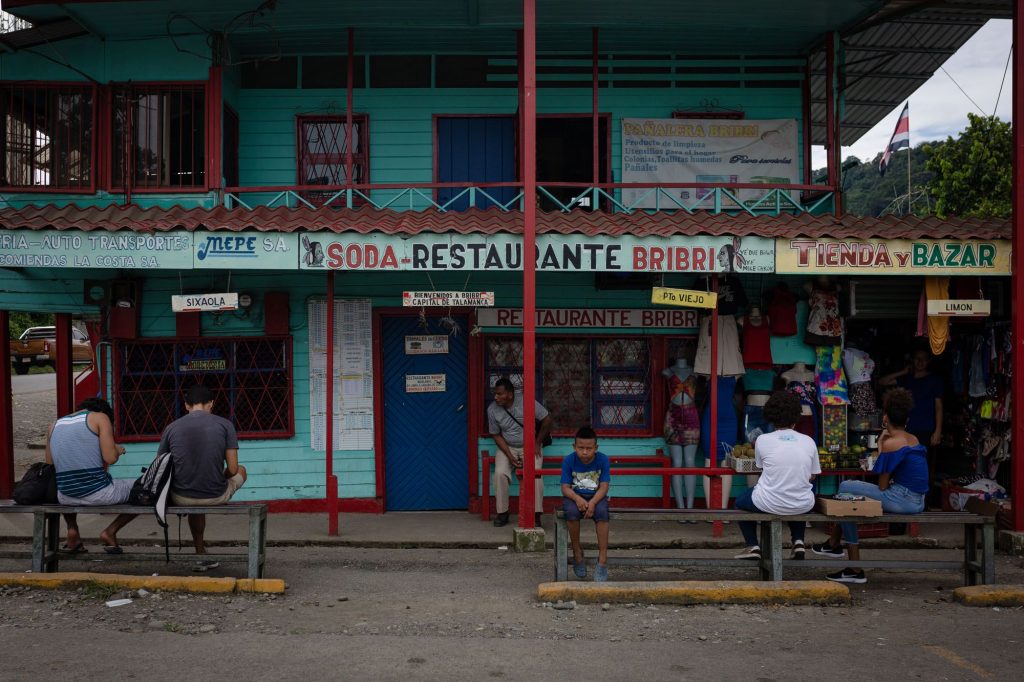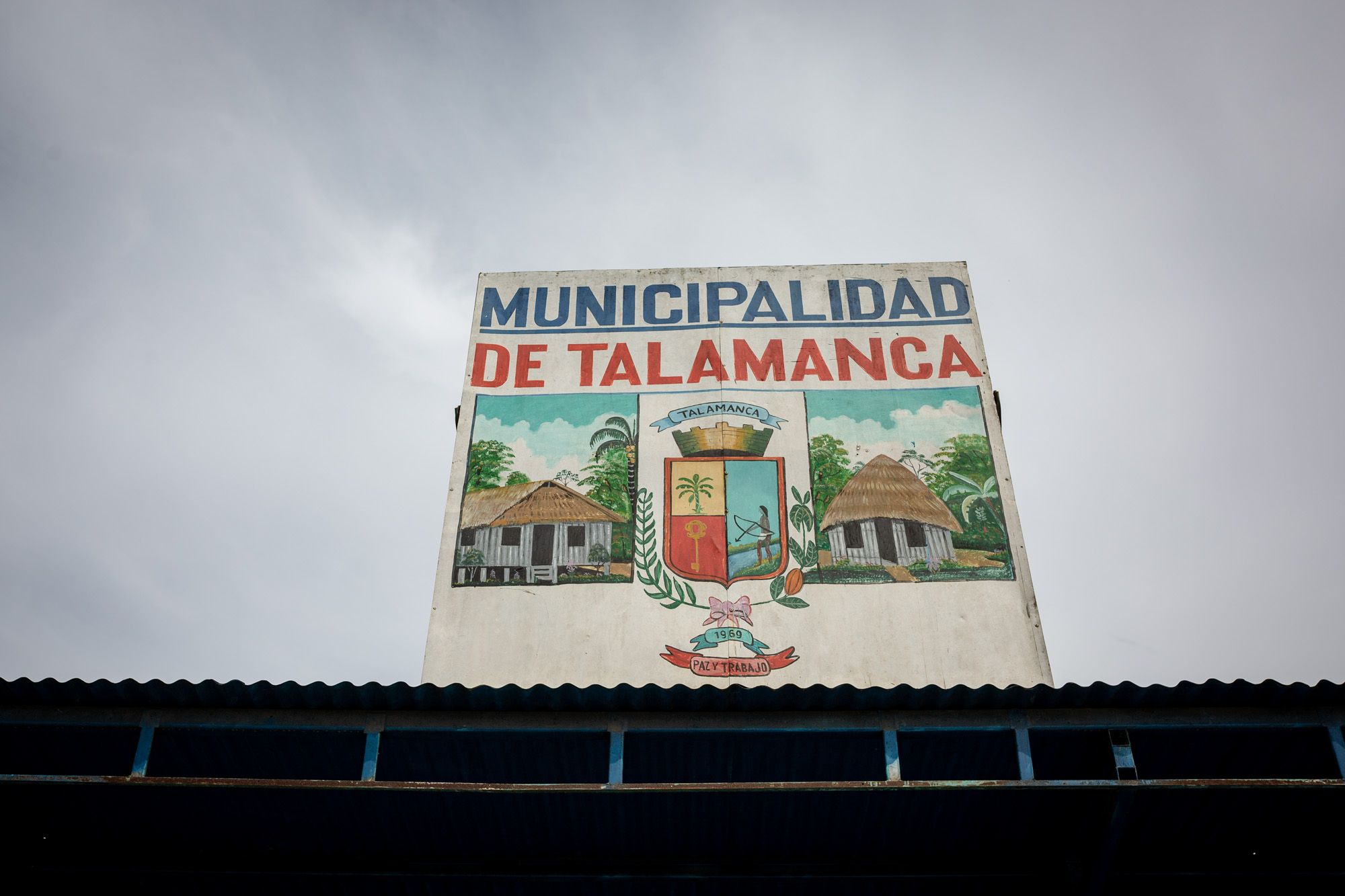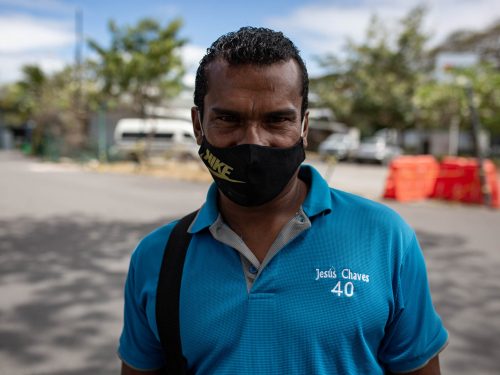
GuanaData, a project of The Voice of Guanacaste, investigates the public budgets of six municipalities in the country, including Talamanca. What are you going to read about in this investigative report?
- Between 2016 and 2020, municipal council members and the department heads for tax collection, treasury, accounting, supply and other departments all had family ties with at least one other official within this municipality. However, these relationships are legal.
- The Municipal Code prohibits hiring immediate family members, spouses or up to third-degree relatives. However, the veto applies only to four positions: councilors, mayors, auditors and recruitment directors. Hiring for other positions is allowed.
***
On May 10, 2016, Jose Pablo Cordero started working at the Municipality of Talamanca as head of the supply department. Ten days earlier, his father, Melvin Cordero, left the position of mayor, but his sister-in-law, Flor de Maria Bran, still worked there as a tax collection assistant.
Marlon Orozco’s case is similar. He has worked as machinery manager for the municipality since April 15, 2003. His wife, Lilliam Barrios Saldaña, has held the position of treasurer since September 16, 1991. Similarly, Karla Blanco has been an accounting assistant since January 15, 2009 and her husband, Gerardo Montiel, currently works as a driver for the same municipality.
Cordero, Bran, Orozco, and Barrios are examples of a larger list of family ties between officials at the Municipality of Talamanca. In total, during the last two local government administrations, the institution reached a total of 12 kinship relationships among employees, of which seven still work there.
All of these relationships are legal because they elude prohibition under the law. Article 136 of the Municipal Code establishes that “spouses or relatives, in direct or collateral line up to and including the third degree can’t be municipal employees.” However, this prohibition only extends to four positions: council members, the mayor, auditor and directors or chiefs of staff of recruitment units. It allows family members to be hired in different positions.
Hiring family members happens elsewhere besides Talamanca. It also happens in the other five cantons that GuanaData investigates. Nicoya has 20 relatives, La Cruz has 23, Limon has 33, Puntarenas has 44 and San Carlos has 61 family relationships in total during the same timeframe.
Of these cantons, Limon, Puntarenas and San Carlos had voter abstentionism of 60% or more during the last two electoral periods, according to the Supreme Electoral Tribunal (TSE- Tribunal Supremo de Elecciones). This means that more than half of the population didn’t turn out to vote.
In the municipality of Talamanca, it’s not just one division taking advantage of this legal loophole. Family relations are present in a variety of departments such as treasury, accounting, laborers and council members.
After reviewing public data and documents, Guanadata’s research found that three types of relationships stand out. The first group is made up of the appointment of two family members, like the examples mentioned at the beginning of this article. Eight cases of this type were present during the period studied.
In the second pattern, a person was already a municipal official when a family member was elected through community vote. Finally, the third type occurs when two people from the same political party obtain a position through a popular election. Between both of these types, GuanaData found four relationships.
When Marvin Antonio Gomez Bran took office as mayor for the 2016-2020 term, his wife, Cindy de Los Angeles Prendas Berrocal, also began working at the municipality as a council member for the Bratsi district. Both belong to the Christian Social Unity Party (PUSC- Partido Unidad Social Cristiana), the same party as the current and three-time mayor, Rugeli Morales.
The results of the Municipal Management Index of the Comptroller General of the Republic’s Office indicate that internal control was the greatest challenge for the Municipality of Talamanca during the last two administrations. In addition, unlike other municipalities, Talamanca doesn’t measure customer service satisfaction.
Conflict of Interests?
Public law attorney Marvin Carvajal, former legal director for the Presidential House, pointed out that the disadvantage of such a limited prohibition is that it could lead to a conflict of interest within the same local government.
“We are talking about civil servants who in one way or another have an influence on decision-making within the municipality. If there are already relationships beyond the professional ones, it will be easier for them to give me permission for a vacation or let me recommend someone for a hiring,” Carvajal told GuanaData.
The current director of the supply department for the Municipality of Talamanca, Jose Pablo Cordero, disagrees. In a telephone interview, he assured GuanaData that his hiring followed the necessary legal parameters and that he and his father didn’t hold municipal positions at the same time.
“The father and son relationship between us actually hardly exists. I qualified because I met the requirements they requested, for example, a bachelor’s degree in business administration and my job as a former supplier for the clerk at Honey Creek,” Cordero argued.
Karla Blanco, an accounting assistant, agrees and explains that, like Cordero, she had no influence on her husband’s appointment as a municipal driver. This is also the case for Lilliam Barrios, treasurer, whose husband is in charge of machinery.
“I’ve been here for 30 years and my husband for about 15. There is a lot of difference and since they are two different departments, I can’t appoint him. I don’t like to get involved in political issues either, but rather I got the job through a bidding process,” said Barrios.
The legal prohibitions and loopholes are also present when a municipality contracts external services. While only the non-existence of family ties with the person in charge of human resources is taken into account for hiring a civil servant, only ties with the person in charge of supply is taken into account for contracting services.
During the last two electoral periods analyzed, GuanaData found 33 kinship relationships between service providers and officials of the Municipality of Talamanca, but none were directly related to the current supplier and therefore, the law considers them legal.

During the last two local governments, the Municipality of Talamanca accumulated 12 kinship relationships, of which seven are still in force. Photo: César Arroyo.
Among these relationships, four contracts for professional services stand out, awarded to the company “Grupo Constructor JCJ y Asociados Sociedad Anónima,” for which Cindy Prendas, wife of the current mayor, Rugeli Morales, and council member for the Bratsi district, is the advisor. Previously, Prendas also served as a council member for the Cahuita district, but she didn’t hold the position when the municipality signed the contracts.
The term that started in 2020 is Morales’ third term as mayor of Talamanca. While he was out of office (between 2015 and 2019), Grupo Constructor JCJ y Asociados received 11 contracts for “food services”. In total, they amount to ₡16.7 million (about $28,000), out of a budget of just over ₡161.4 billion colones (about $270 million) that the municipality managed during those years.
The loophole has grown over the years. For example, since 2017, ruling C-162-2017 of the Attorney General’s Office allows a vice mayor II to bid on and win public contracting processes. This happened in 2018 in Talamanca with two contracts that totaled ₡4.1 million (about $7000) for two municipal advisory services from the vice mayor to the local government.
“I don’t see anything wrong with them. The vice mayor II doesn’t receive a salary from the municipality and I’m sure that for that period, the mayor and vice mayor didn’t even take vacations,” the municipal legal advisor, Hector Saenz, told GuanaData.
How Can This Practice Affect a Canton?
There are several factors that influence whether or not a municipality can have several related officials, such as the size of the canton’s population or the level of access to education.
Also, the same law prevents applying this prohibition retroactively. That means that it wouldn’t apply to people who already worked for the municipality before a relative is elected to office by popular vote.
For this reason, the person in charge of civil engineering for the Municipality of Talamanca, Manuel Ignacio Leon Guido, can keep his position even after his grandson became a council member in 2020. The same situation occurred with former vice mayor of the canton, Alicia Hidalgo Fernandez, who is related to one of the equipment operators.
“I’ve been a municipal official since 2012 and if he came in by popular election, it isn’t that I appointed him. It seems to me that the prohibition is correct and likewise there are internal filters that help keep everything legal,” Leon told GuanaData. Hidalgo shared a similar position.
However, Ronald Alfaro, coordinator of the Strengthening the Democracy chapter of the State of the Nation Report, warns that when this practice occurs in high ranks, you run the risk that the personal interests of the officials take precedence over those of the canton’s population.
The issue is what causes this secrecy. Little by little, a local oligarchy is created, where there are groups that remain in power for a long period. This could cause the interests of certain groups to be given priority and others from other groups that are not represented to be put aside,” Alfaro explained to GuanaData.
According to Alfaro, a high number of relatives in the same municipality can affect the performance of a local government, since when there is a relationship beyond the professional one, accountability or transparency is more difficult.
The 2018 Municipal Management Index, a study by the Comptroller General of the Republic’s Office, uses 61 indicators that measure regulatory and technical aspects relative to the management of all municipalities and gives a rating ranging from 0 to 100. The lower the classification, the lower the municipal performance was in aspects such as planning, environmental development and economic services.

Of the six cantons that GuanaData studies, Talamanca is the one that maintains the lowest score in the Municipal Management Index. Photo: César Arroyo.
In 2018, the Municipality of Talamanca was given a rating of 48.52. Of the six cantons that GuanaData studies, Talamanca is the one with the lowest score. The index places the municipality in the last group of four categories and indicates three main deficiencies in its work: partial or no compliance with citizen participation and accountability, management of social services, and internal control.
This lack of internal scrutiny becomes more complex when a high percentage of the population doesn’t vote. According to the Supreme Electoral Tribunal, 46.57% of the canton didn’t go to the polls in the 2020 municipal elections. However, high abstentionism is common in these elections, according to the National Political Observatory.
The effect of low participation goes beyond publicly elected positions, explained Alfaro, and can be an indicator of the little scrutiny that a local government receives. In turn, this can lead to more people being unaware of who works in their cantons, thereby fostering these types of relationships.
The tool of citizen participation is precisely what Alfaro recommends to counteract the effects of the loopholes in the law.
“We also have to ask ourselves if there are appropriate regulations to limit these possibilities. The best thing we can do as communities is to pay attention to the decisions that my municipality makes: what kind of projects is it doing or where is it spending the money? These institutions should always look out for the well-being of the community,” Alfaro added.
*******
What happens in the other municipalities?
GuanaData chose to focus on Talamanca because it found that family relationships within this municipality occur between high-ranking officials, such as suppliers and mayors. However, the appointment of relatives is not a dynamic exclusive to this canton. In fact, GuanaData found that the five municipalities in the project also do it.
During the last two local government terms, there were 20 family relationships in the municipality of Nicoya, 23 relationships in La Cruz, 33 in Limon, 44 in Puntarenas and 61 in San Carlos.
- La Cruz and Limon: In both municipalities, a large part of the personnel for services such as cleaning, treasury, courier services and laborers, are related to high-ranking officials like mayors or other coordinators. For example, in La Cruz, the traffic management unit assistant is the sister of the municipal clerk.
- Puntarenas: GuanaData found more municipal officials in advisory or auxiliary positions who share family ties in the canton of Puntarenas. For example, the legal services coordinator and the land registry and appraisal assistant are spouses. So are the assistant auditor and a machinery operator and six other people in various positions.
- Nicoya: Within this municipality GuanaData found a greater number of family relationships in high ranks. For example, the former vice mayor Marco Antonio Jimenez Muñoz is the brother-in-law of the budget and planning coordinator, but since she worked for the municipality before he was elected, the prohibition didn’t apply. On the other hand, the territorial planning and environmental services coordinator and the legal services coordinator are spouses.
- San Carlos: Of the 61 kinship relationships there, four are relationships that the law does prohibit. In particular, the case of the current mayor, Alfredo Cordoba Soro, has ties with one of the laborers
- Puntarenas: GuanaData found more municipal officials in advisory or auxiliary positions who share family ties in the canton of Puntarenas. For example, the legal services coordinator and the land registry and appraisal assistant are spouses. So are the assistant auditor and a machinery operator and six other people in various positions.







Comments